I may get a paid commission for purchases made after clicking a link in this post, click here to read my disclosure.
A link shortener is a great tool for any blogger to have in their arsenal.
They offer several advantages that make them an essential part of any successful blog strategy.
First, link shorteners make it easier to share content with your readers.
By providing a shorter URL,
You can save valuable characters on social media posts and emails while still sending readers directly to the content they want.
This allows you to write more engaging content instead of filling up space with long URLs and potentially turning off readers before they even click through.
Link-shortening services offer tracking capabilities,
so you can monitor how many clicks each post receives and where those clicks are coming from.
Having access to this information can help you identify which strategies work best for getting people engaged with your content so that you can optimize your efforts accordingly.
When using links on third-party websites and directories like Quora or Reddit,
having shortened links is often required since most places limit the number of characters allowed in text fields, plus it looks better.
Whether you’re trying to create more website traffic and engagement for your blog or looking for ways to monetize your website, link shortening can be a powerful tool for doing so.
Fortunately, there are numerous link shortener options out there that can help increase your click-through rate (CTR) and further optimize your existing campaigns.
In this article, we’ll take a look at nine of the best link shorteners available today, focusing on their pricing models as well as their benefits so you can pick the one that works best for you and your budget.
Let’s dive in!
Why Shorten your Links?
Shortening your blog links is an important step in building and maintaining a strong online presence.
Not only do short links help you to maintain control over the URLs associated with your content,
but they also allow you to better track traffic, measure success, and boost SEO ranking.
Creating long URLs often results in broken or incorrect linking due to the length of the URL itself.
Shortened links have been proven very effective in getting people’s attention when it comes to marketing purposes as well as spreading information quickly over social media platforms due to their aesthetic nature.
They are also easier for customers or followers who may be copying and pasting from your posts or website onto other websites,
which can improve the overall customer experience regarding sharing content related to your organization or brand.
URL shorteners such as Bitly provide robust tools for tracking link performance,
This way, you can easily get an idea of how many people clicked on a certain link within a set amount of time and what type of devices were used e.g., mobile vs desktop.
This insight can help inform future content creation decisions by allowing you to analyze which pieces perform best among different channels e.g., Twitter versus Facebook.
By using shortened URLs every time you post a blog article or product update on any social media platform or other web-based location like forums etc,
Not only will finding and sharing information become easier, but the chances that traffic would be considerably higher than actually having customers or readers attempting longer URLs will increase significantly!
What is a Link Shortner?
A link shortener, also known as a URL shortener, is a tool that allows you to shrink lengthy web addresses into shorter and more manageable links.
These shortened links can be shared across the web in emails and social media sites such as Twitter, Instagram, and Facebook.
Link shorteners help make sharing easier by reducing the number of characters in an otherwise long URL so it is less cumbersome for readers to click on.
It also helps conserve limited space when sharing URLs within text messages or other applications where character count matters.
Furthermore, it can cloak or hide the original address which may contain personal information that should remain private.
Shortening largely irrelevant strings of code makes the content look cleaner and more professional.
Until recently, many third-party link shorteners were available such as Bitly, Goo.gl (previously Google’s official service), and TinyURLs among several others with varying features such as customizations (i.e., vanity URLs), integration with analytics services to measure clicks, branded domains or QR codes for tracking activity via print media outlets, etc…
However some of these are now being phased out due to tighter regulatory restrictions over data privacy concerns resulting from GDPR implementations in place of native services provided by application developers like Twitter itself for example,
where users have access to t.co links tailored specifically for their platform oftentimes with built-in analytics tools allowing them an opportunity to review who has clicked their post or tweet etc…
At its core though, regardless of which specific service one might choose,
Fundamentally speaking,
A good link shortener simply condenses lengthy URLs into something much more manageable going forward so they don’t break any layout constraints while providing additional benefits like privacy protection from prying eyes during transit
Qualities of a Good Link Shortener
There are several qualities that make a good link shortener, each of which should be taken into consideration when assessing the most appropriate one for your needs.
1. Usability: A user-friendly link shortener is essential, especially if you are targeting non-technical users or those with limited technical skills. Look for features such as an intuitive UI/UX design, clear and concise instructions and guidance on how to shorten links, and easy integration into apps or websites.
2. Security: When selecting a link shortener, it is imperative to choose one that has reliable security systems in place so your shortened links remain secure from potential hackers who may want to redirect them elsewhere. Look for features such as link encryption and IP-blocking capabilities.
3. Analytics and Tracking Tools: Selecting a link shortener with advanced analytics and tracking tool is essential so you can measure which platforms the visitors come from, what device they use, where they are located geographically, the number of clicks per day, week, or month, etc., as well as other valuable data points that can help inform future marketing campaigns and strategies.
4. Brand Recognition: Customizing distinctive URLs associated with your company’s brand name will enable customers to locate your content more easily via search engine searches or social media channels simply by typing in branded terms related to you instead using generic terms like “6figureblogger.com”, this ensures that customers find exactly what they’re looking for quickly without having any difficulty doing so!
5. Custom CTA Options: Choosing a link shortener that offers customizable call-to-action options allows you to customize clickable buttons within emails or SMS messages leading directly toward purchase pages or their desired landing pages, this reduces customer journey friction dramatically increasing conversion rates significantly!
Top 9 Best Link Shorteners for Bloggers
1. Bit.ly
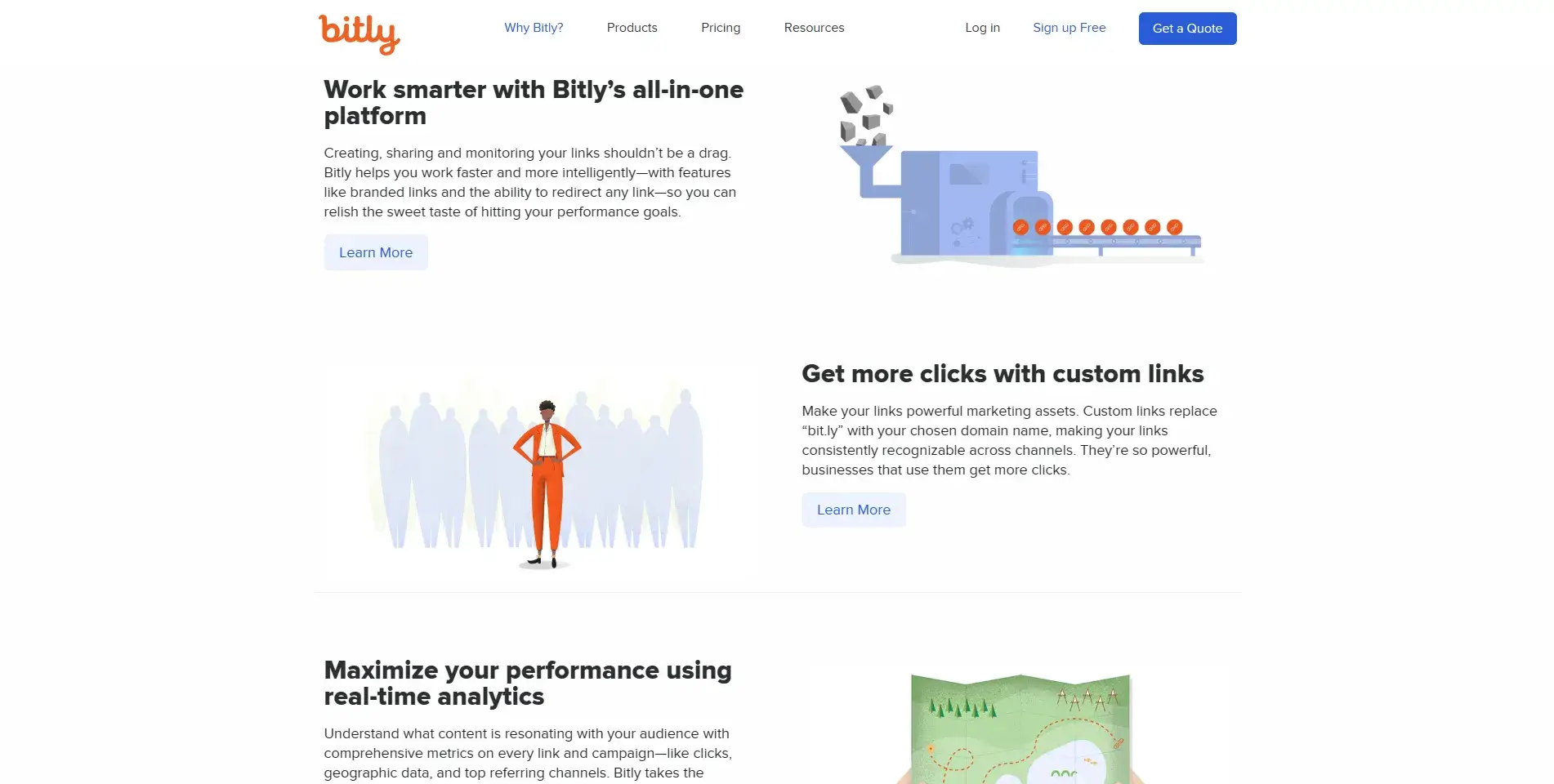
Using Bit.ly on your blog is a great way to create shorter link URLs that are easier to share with others.
Benefits of using Bit.ly include:
- Easier Sharing: It’s much easier for you and your readers to share links when you use Bit.ly because the URLs are shortened so that they’re easier to type into social media platforms like Twitter or Facebook, or even text messages if desired.
- Data Tracking and Analytics: By using Bit.ly, you can take advantage of its powerful analytics tools which provide real-time data about how often people click your links, as well as from where those clicks originate geographically.
- Branding Opportunities: Using bit.ly allows you to customize URLs by adding keywords or phrases related directly to your blog content so that they stand out more when shared across social media channels.
The Free plan includes up to 10 branded links per month, Bitly-branded Link-in-bio, and Bitly-branded QR Codes, the starter package includes up to 200 bit.ly links per month, and comes with free Link-in-bio, link redirects, click and scan data and access to support for $8 a month.
The Basic plan allows up to 1,500 branded links per month with everything in the starter plan plus a complimentary custom domain, QR Code colors and logos, and branded links for as little as $29 per month.
The premium version combines features from the starter plan with 3,000 branded links month per month, an advanced performance dashboard, Campaigns, QR codes, and multiple download formats with location and device type data reports for $199 a month.
The Enterprise Plan offers 10,000+ branded links per month, Multiple users, large-scale link generation, account manager support, Group permissions, and up to 99.9% SLA uptime for custom pricing.
2. URL Shortener By Zapier
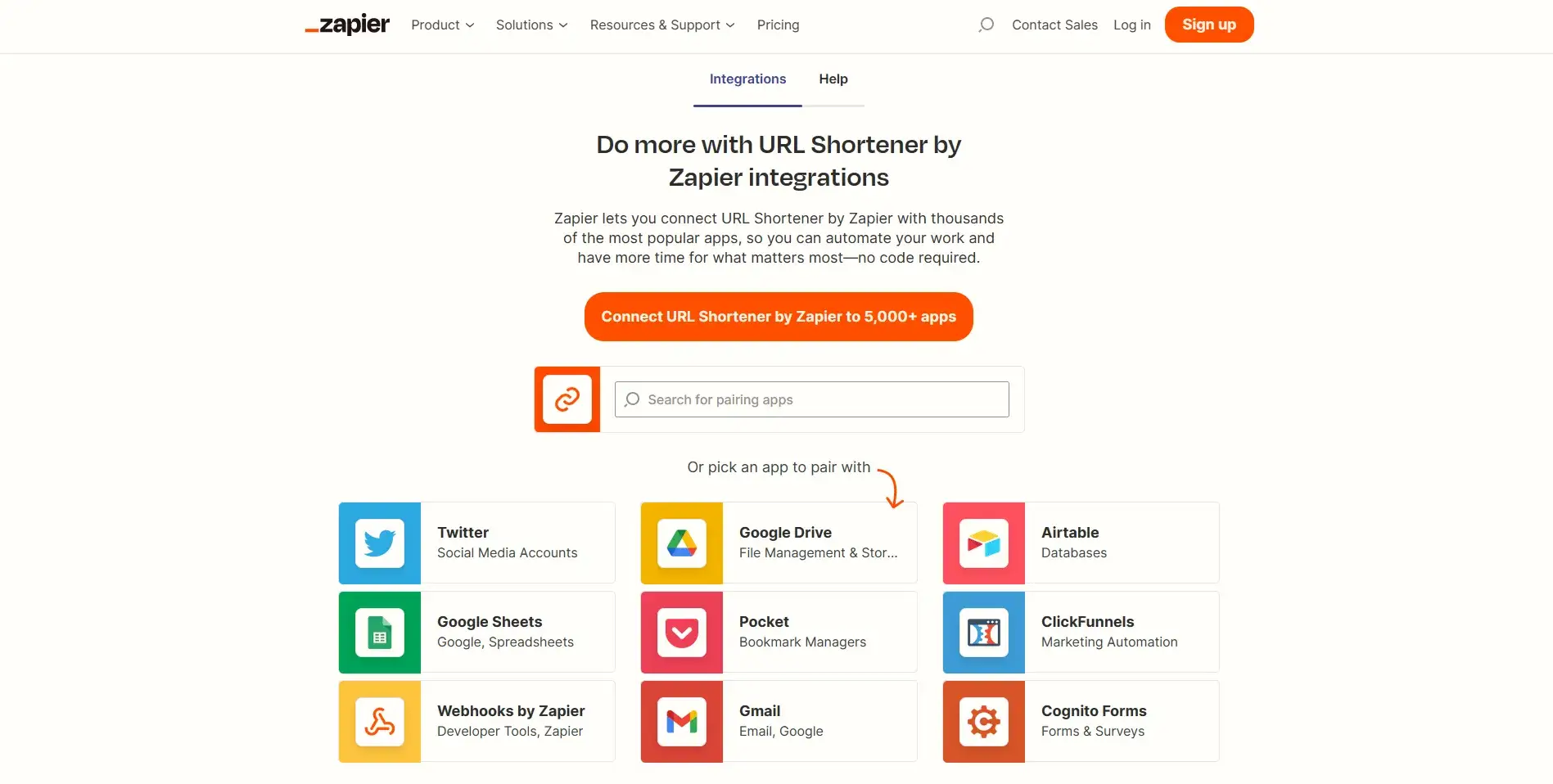
URL Shorteners by Zapier is a great way to strengthen the power of your blog.
With Zapier’s URL shortener,
You can customize the link for better visibility and easier navigation for your readers.
It also helps with page speed optimization since long URLs tend to be slow loading.
What really sets Zapier apart is that it allows you to monitor how often each link is clicked, see which devices they opened on, and get an overview of overall usage trends across all links.
You can access this data within your dashboard or in a downloadable CSV report.
Monetarily speaking, paid plans range from $7 to $800 per month depending on your needs, you can also try it out for free using their forever free plan.
This makes it very affordable compared to most other URL Shortners out there so if cost efficiency is a priority then it’s worth considering Zapier.
The main benefits of using URL shortening with Zapier include more control over how users engage with your content
It offers improved SEO rankings, enhanced tracking capabilities, faster loading times, and streamlined sharing capabilities across social media networks including Twitter, Facebook, WhatsApp, and others.
So if you’re looking for ways to improve user engagement or optimize marketing campaigns then we highly recommend trying out URL Shorteners by Zapier!
3. Rebrandly
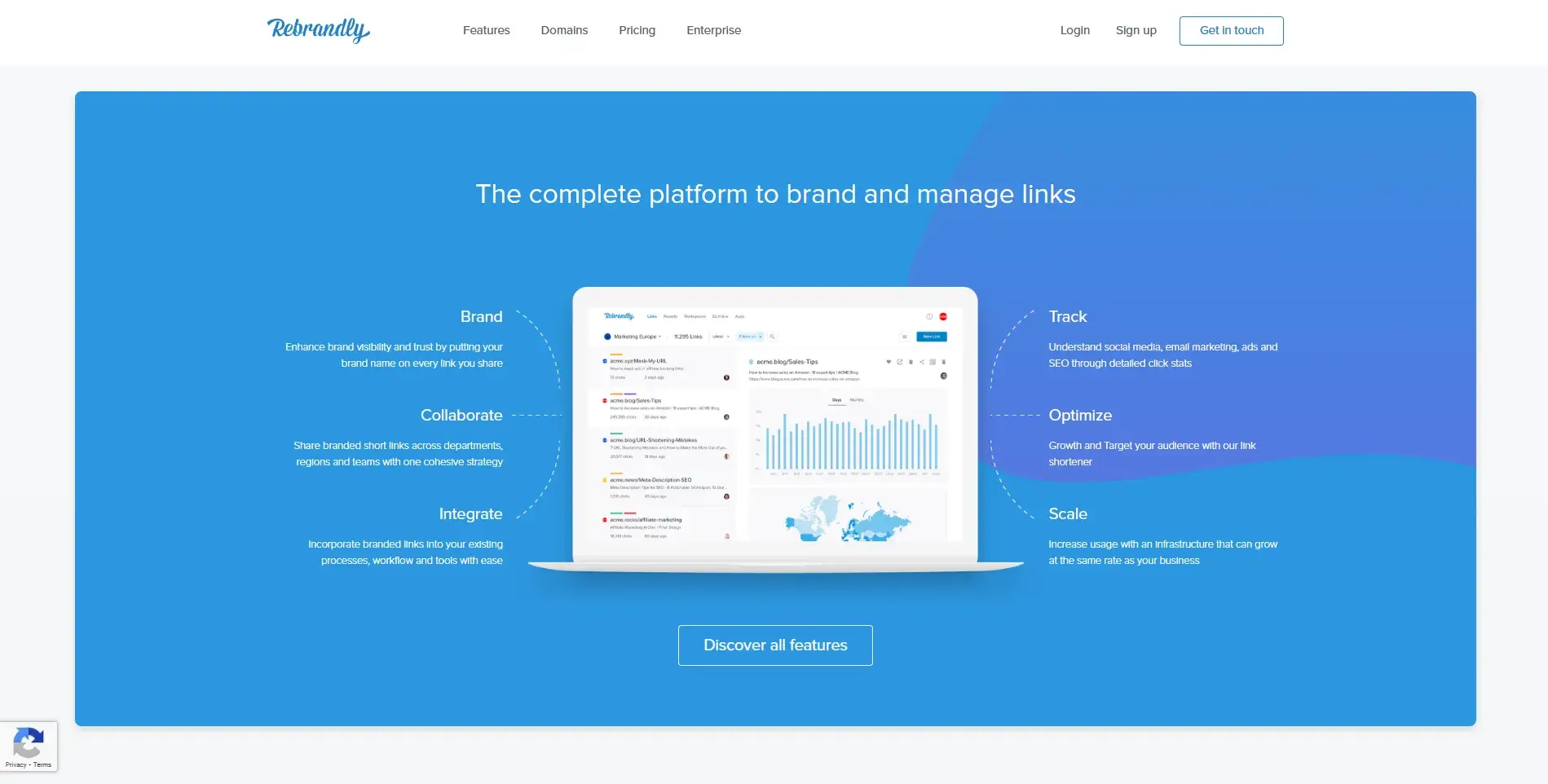
Rebrandly is an amazing tool for anybody looking to create branded links and track their performance.
It’s the perfect solution to making sure that all of your promotional activities reach the right audiences, so you can maximize the impact of your advertising efforts.
Rebrandly allows you to create shortened versions of URLs that are customized with a custom domain name and deeply-integrated analytics tools.
This way, you can track where your clicks are coming from, how well each campaign performs, and make data-driven decisions about which campaigns perform best for certain types of users.
Rebrandly also offers a range of pricing plans ranging from $0 where you get up to 250 branded links and 2500 tracked links per month, all the way up to the Professional packages costing $85 per month with up to 15,000 branded and up to 150,000 tracked links per month.
The great thing about Rebrandly is that it provides more control over branding than traditional shortening services like Bitly or TinyURL do
Allowing brand owners greater flexibility in terms of customization features such as on-page visuals, titles, and descriptions.
Plus, with its integrated tracking dashboard powered by Google Analytics and UTM parameters data, businesses can analyze one single click funnel across multiple channels without having to use multiple platforms at once, resulting in far better cost efficiency when running campaigns online!
4. Short.io
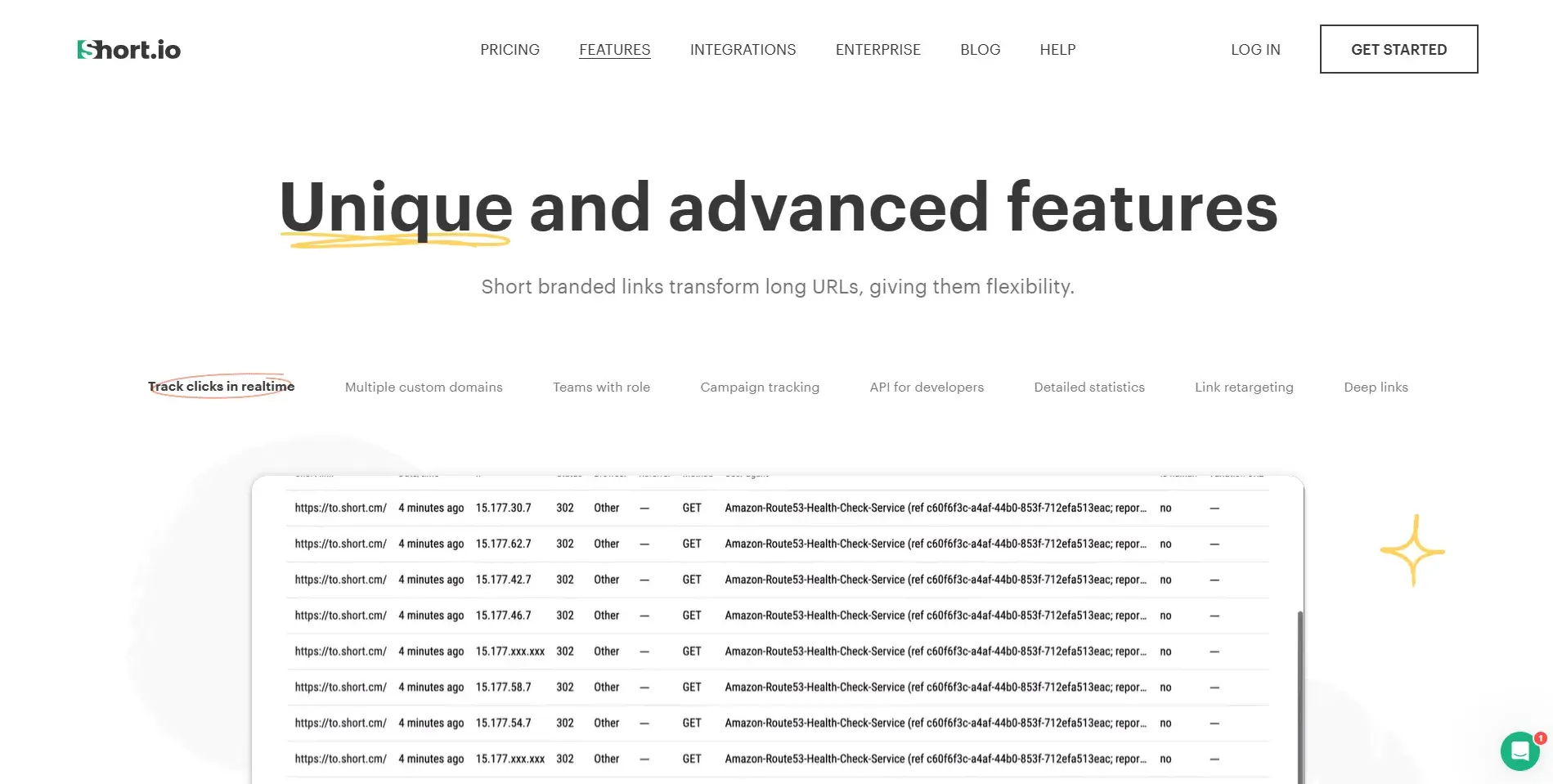
Short.io is a powerful link shortener that offers many benefits to bloggers and content creators.
It’s the perfect tool for transforming long URLs into shorter ones, making them easier to share on social media and other platforms while providing essential analytics insights, all at an affordable price!
The basic plan from Short.io only costs $19 per month but provides a wealth of features to help manage links, track clicks, analyze performance, and more. These include:
- Link customization – make each URL look as unique as your blog content with a custom domain or branded vanity URLs
- Advanced analytical tracking – get detailed reports about user engagement such as top referrers, device types used by visitors, geographic information about conversions (an important factor when managing online campaigns), and even heat maps of where people clicked on each page
- Protection against malicious links – keep your readers safe by automatically blocking links that contain potential malware or viruses
- Multiplatform compatibility – use one link across social media accounts so even if they’re posted in different places you know who’s clicking which link
- Automation features – set up automatic redirects when certain conditions are met so you don’t have to continuously update your content manually
Overall, using Short.io can save time and effort while also increasing brand recognition through customized URLs along with helping generate better insight into audience engagement through detailed analytics tools, all at an affordable price point!
They also offer a free plan where you can up to 1000 branded links for free, set up 100 link automation and unlimited link re-directs and even tack up to 50,000 links without spending a dime!
This makes it the perfect solution if you’re looking to cut down costs while still making use of professional link-shortening benefits.
5. Tiny URL
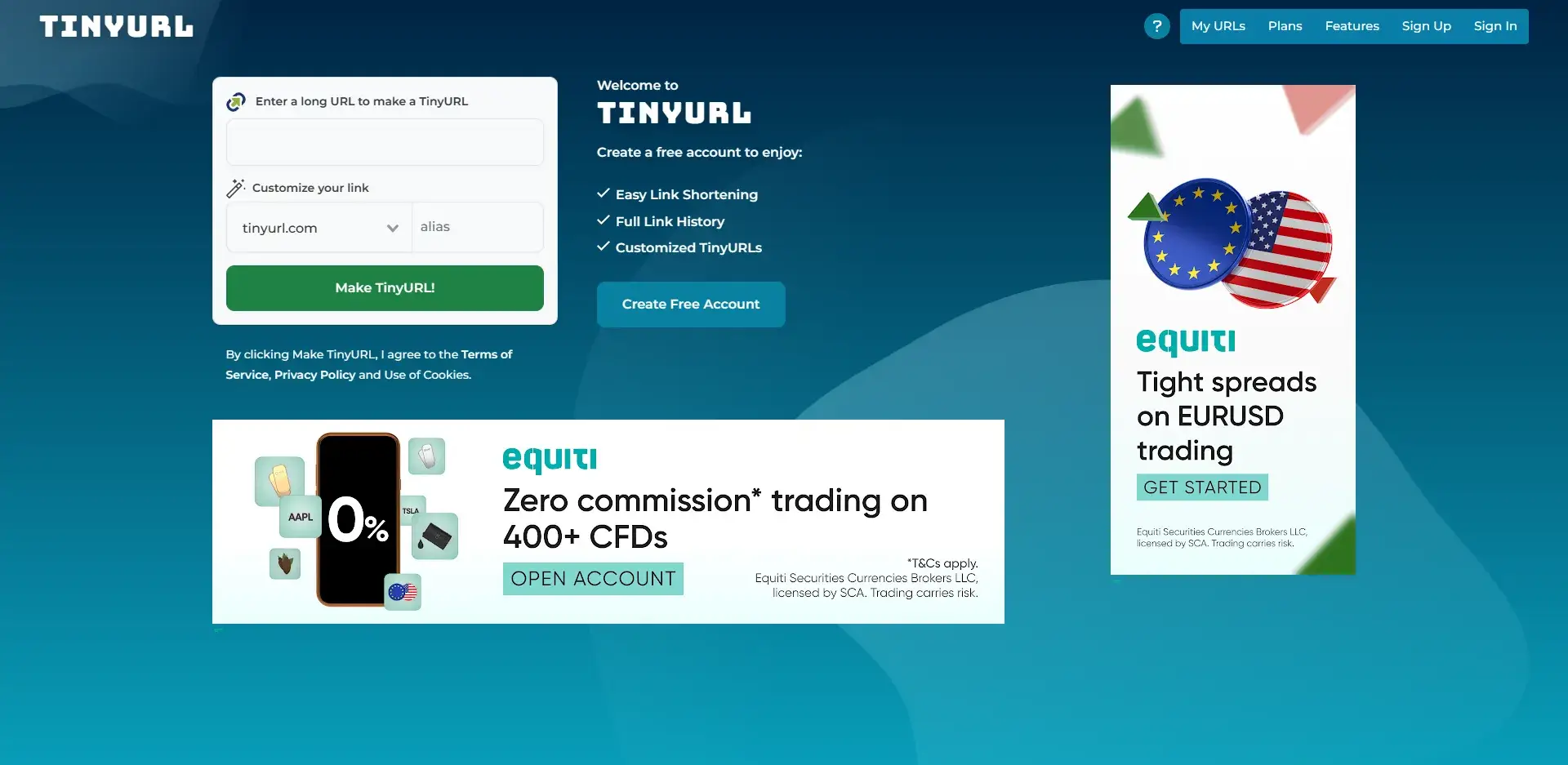
Using a URL shortener like Tiny URL on your blog is one of the most effective ways to create shorter and more manageable links for various content pages.
This can be particularly useful when linking to longer web pages, as it allows you to simplify the link by condensing its length.
Shortening URLs, also makes them easier to remember – something that can often be important from an online marketing perspective.
One of the primary advantages of using a link shortener like Tiny URL is that you’ll boost your click-through rate (CTR).
That’s because users are more likely to click on shorter and simpler URLs than longer ones.
Also, with a shortened link,
You make it much easier for users who are scrolling through long web pages or posts without having to spend too much time trying to decipher lengthy links or search them out in tedious detail.
Another benefit of using Tiny URL is that they give you access to powerful analytics tools so that if you’re dealing with recurrent visitors or customers, you can track their interactions in real-time and measure their activities over a given period such as their clicks and referrals, etc.,
Allowing marketers greater control over leads acquisition processes while providing valuable feedback into product improvement initiatives,
This information could prove invaluable in terms of making decisions regarding pricing strategies, etc.
In conclusion, there are numerous benefits associated with using a URL shortener like Tiny URL since it is specifically designed for blogs and other websites,
It encourages increased click-through rates, simplified user experience for those engaging with your content on mobile devices, improved tracking capabilities that enable better analysis, etc
And all together resulting in increased ROIs and improved operational efficiency, making website monetization efforts even more cost-effective!
6. BL.INK
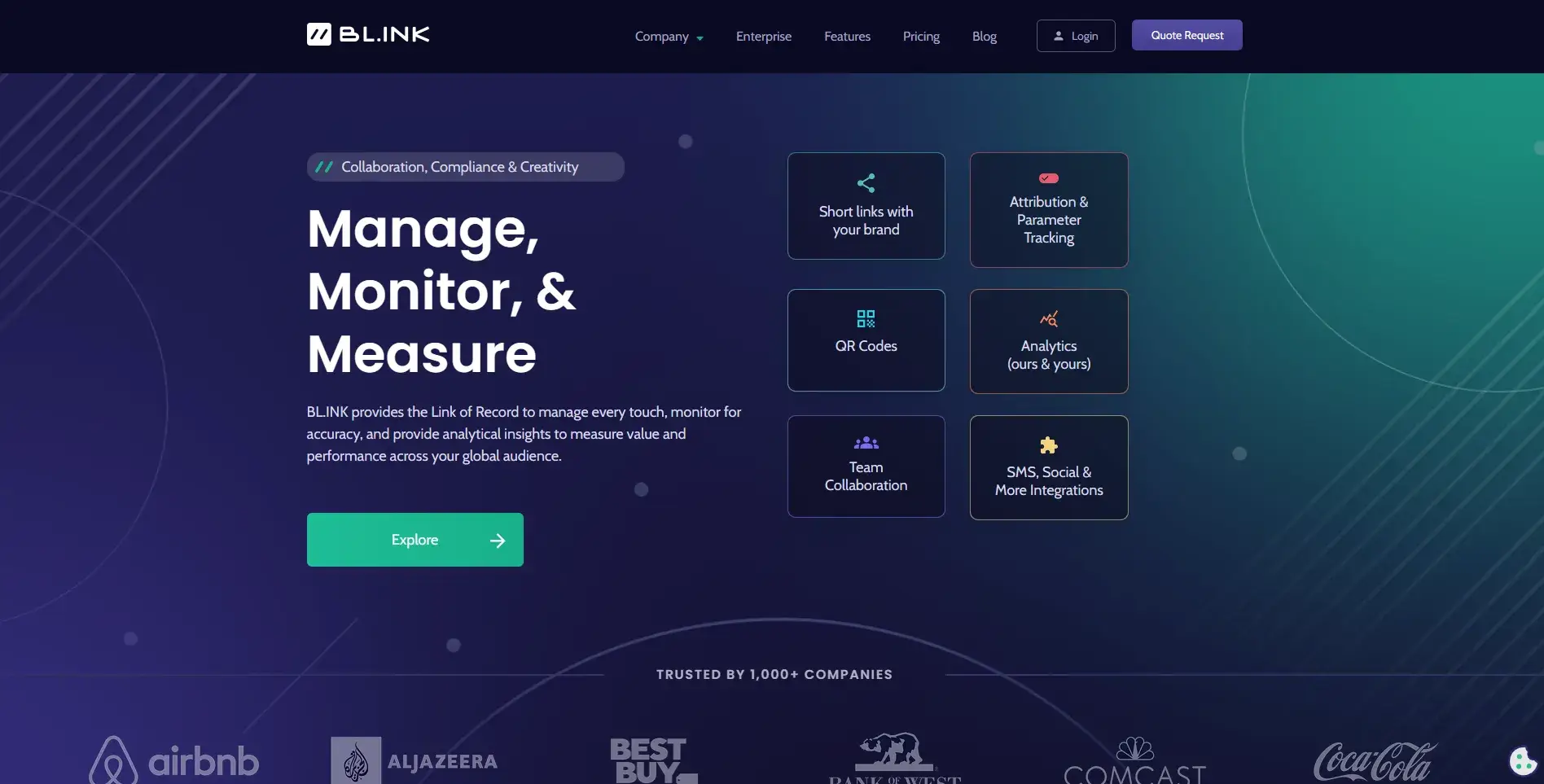
When it comes to blog marketing, link shortening is an essential tool for many reasons.
Bl.ink is an ideal choice for such a task, as it provides the necessary features needed to efficiently shorten long links and ensure that your blog content looks professional and consistent across various platforms.
In terms of cost efficiency, bl.ink offers a range of pricing options depending on your project’s needs or budget.
For starters, you can opt for their expert plan which gives you access to their basic services such as analytics tracking and click-by-click traffic insights, and starts at $49 per month or if you feel like you need more you can go for their business plan which costs $600 a month with really great added value options perfect to run a full-scale business.
These include limiting specific IP addresses from accessing shortened links, redirecting users based on geographic regions for better-localized engagement strategies (allowing the same URL but with different endpoints), using vanity URLs custom-made for maximum branding impact, etc.,
All allowing you greater flexibility over how your content reaches its intended audience in a timely manner without any issues whatsoever!
Plus, they support integrations with popular CMSs such as WordPress and Tumblr so that installation takes less effort when compared to custom embeds or manual copy-pasting codes elsewhere in order to maintain consistency across multiple channels at once,
This helps save time and effort when managing multiple campaigns simultaneously!
All in all, bl.ink provides a great combination of features within its varied price range which makes it one of the best value link shorteners out there today,
Ideal for both individuals who are working on one campaign or multiple projects at once and full-fledged business managing over 100 websites or blogs.
7. Tiny.cc
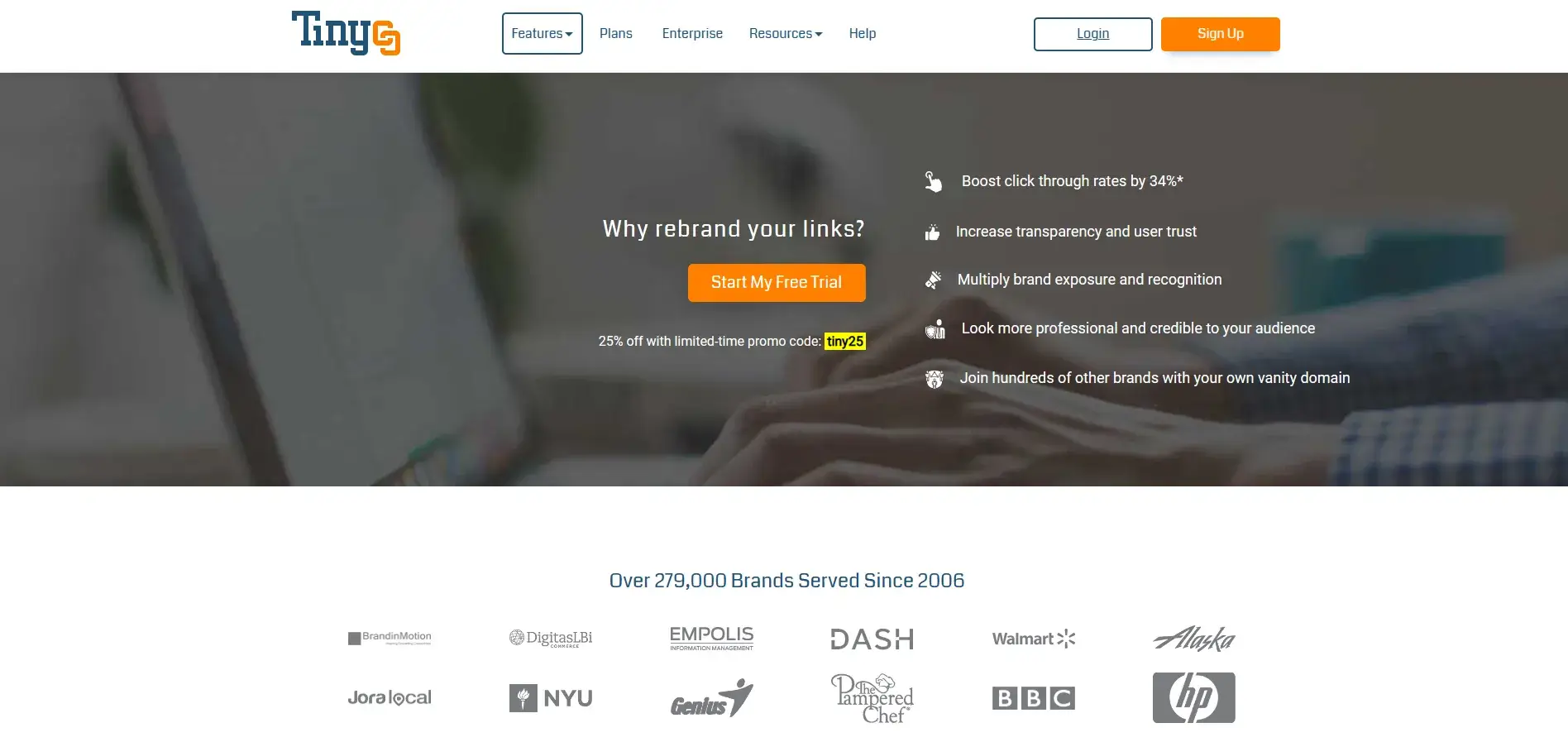
Tiny.cc is a link shortener that helps you condense long URLs into shorter, more manageable links for use on your blog or other digital platforms.
With Tiny.cc, you can keep track of how many people have clicked the shortened link and measure its impact online.
Compared to some other link shorteners, Tiny.cc offers several advantages:
- It has an intuitive dashboard that allows users to easily manage and analyze their data on shortened links all in one place, no more switching between tabs to access analytics information!
- Unlike many free link shorteners, Tiny.cc doesn’t add any ads or redirects to your blog posts, instead, it keeps readers focused on the content.
- The service also includes a URL expander tool that lets you quickly restore any existing Twitter or Facebook post with the original destination URL if needed for troubleshooting purposes down the line.
In terms of pricing, Tiny.cc offers very affordable options ranging from a free plan costing $0 to the Pro subscription plan which costs $44 a month, and a custom Enterprise plan with increasing levels of features tailored for small businesses.
With each plan comes additional features such as custom domains and tracking pixels (for learning more about customer behavior), team member accounts management, and collaboration tools to streamline workflow.
Overall, whether you’re an individual blogger just starting out or a more significant business looking to optimize brand awareness online,
Tiny CC can provide great value with its range of affordable solutions!
8. Sniply.io
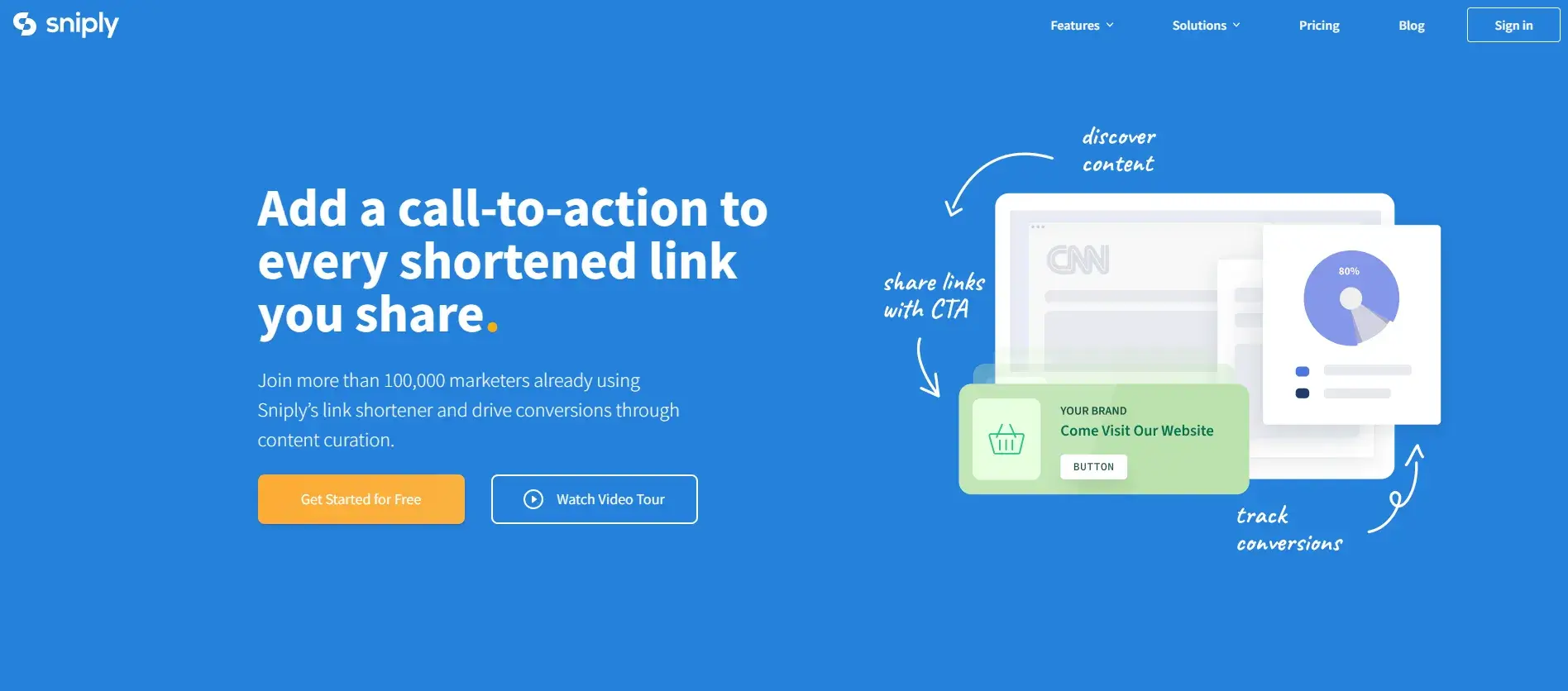
Sniply is a powerful link shortener and call-to-action platform that allows you to add a customized call-to-action (CTA) button to every link you share.
With Sniply, you can track clicks and conversions from other websites, gain valuable insights into your audience, reach new leads via social media channels, and create reflow campaigns for your blog posts and newsletters.
Sniply also serves as an effective monetization tool for content owners.
When sharing content from third-party sites,
Sniply makes it easy to place a branded CTA or custom message on those links in order to drive more qualified traffic back to your site or products.
Additionally, users can turn the shared links into revenue opportunities by utilizing the built-in ad network system within Sniply when their followers click out of their website or blog post.
When it comes to pricing plans there are 3 tiers: The Basic plan ($9 per month), the Pro plan ($29 per month), and the Business plan ($59 per month).
Each tier has different features with varying levels of access depending on what needs may be required.
For example; The basic plan includes up to 250 Sniply links per month and up to 5,000 CTA impressions, while the Pro Plan allows up to 3 team members to manage up to 5 brands on 5 different custom domains, among other advanced features.
Ultimately each pricing tier fits certain audiences differently depending on their budget size and the goals they’re trying to achieve by using Sniply’s services.
9. Polr
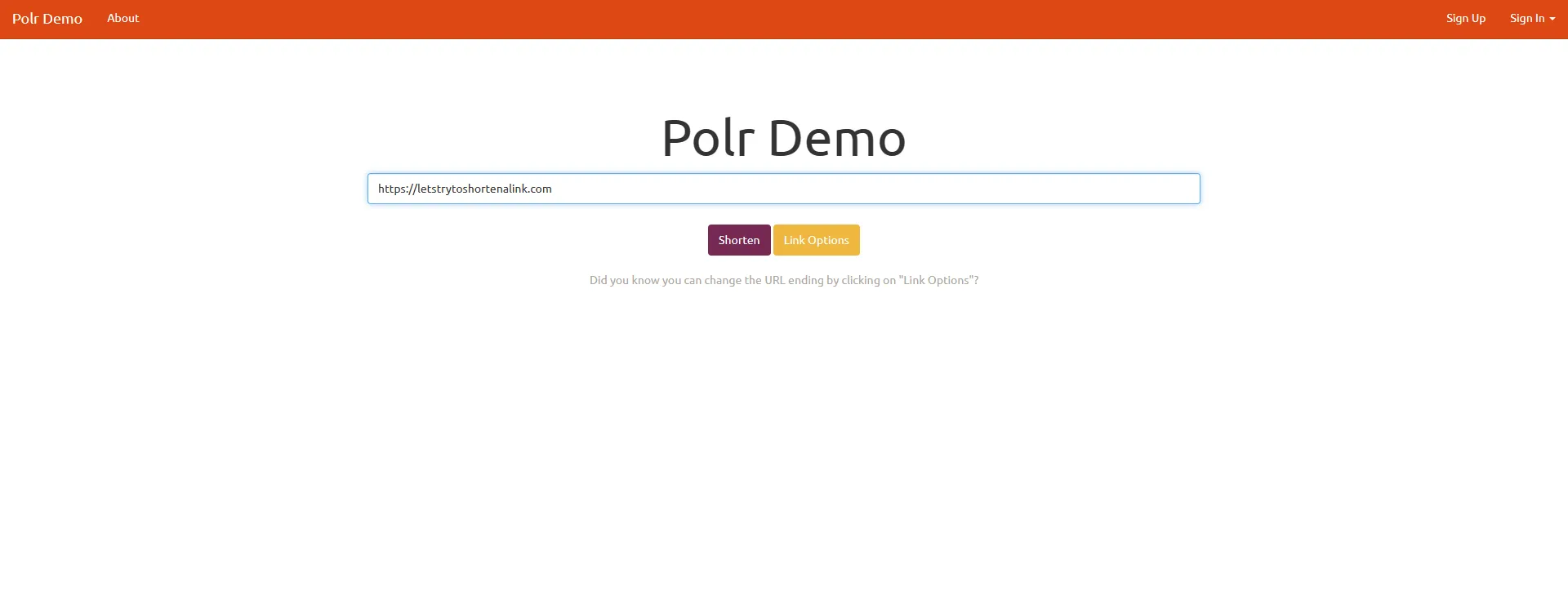
When it comes to blogging, one of the most important things you need to consider is your content’s URL.
Link-shortening services, like Polr, are becoming increasingly popular because they make sharing URLs simpler and easier.
Polr provides an easy-to-use link shortener that allows users to quickly shorten long URLs into something much more manageable and appealing.
It is a great option for bloggers as it offers many features not found in other link shorteners, such as the ability to customize your links with custom domains or custom alias names.
This level of customization will help enhance brand visibility and recognition when linking from blog posts or product reviews on Twitter, Facebook, Reddit, or any other social media platform.
Additionally, Polr supports HTTPS encryption which helps promote trust among visitors visiting shortened links from blogs or websites shared by you.
Polr also allows free usage, so if you only need occasional usage this might be an ideal approach for managing your blog’s shortened URLs over time too!
Conclusion
There are a variety of link shorteners available for bloggers to choose from, depending on their specific needs.
Each link shortener has its own unique benefits and features that can make it the best choice for different blogging scenarios.
Bitly is one of the most popular link shorteners due to its ease of use, intuitive dashboard, and powerful analytics capabilities.
It can provide deep insights into how well your links are performing in terms of clicks and referrers, allowing you to better understand your readership at a glance.
Additionally, Bitly is compatible with a wide array of platforms including all major social media networks (Facebook, Twitter, Instagram, etc.).
Another great option is Rebrandly which focuses more on brand awareness than other solutions do by enabling you to customize slugs so they include words related to your brand name or product names instead of generic strings like “go” or “bit”.
The interface also allows users to create QR codes quickly and easily if needed.
Rebrandly integrates seamlessly with other popular marketing platforms such as HubSpot, Buffer, etc.,
plus it offers detailed analytics data regarding each individual link’s performance over time.
Which Link Shortener do you currently use for your blog? is it listed here?
Let me know, leave a comment below.

